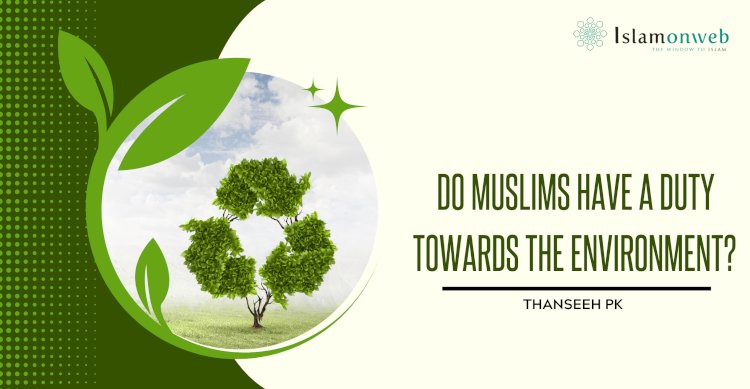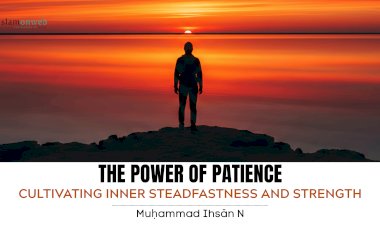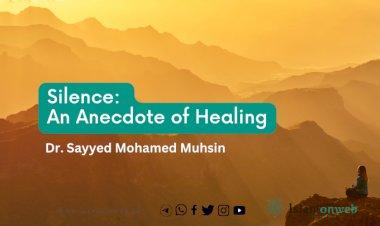Do Muslims Have a Duty Towards the Environment?
Natural disasters have increasingly worsened due to environmental degradation over time. The year 2024 in India stands as a grim reminder of humanity’s disregard for ecological balance, with cyclones, floods, and landslides causing widespread devastation. Cyclone Remal wreaked havoc in West Bengal and the Sundarbans, while landslides in Wayanad, Kerala claimed over 420 lives. Vijayawada faced severe flooding, submerging entire communities, and Himachal Pradesh suffered from destructive cloudbursts.
These disasters underscore the deep connection between human activity and environmental consequences. For Muslims, this issue carries particular weight—not only as a social obligation but as a divine responsibility. The Qur’ān and Sunnah lay out a comprehensive framework of environmental ethics, offering guidance on addressing ecological crises.
In this article, we explore Islam’s perspective on environmental responsibility and how its principles are not only relevant but essential in confronting the environmental challenges of our time.
Islamic Teachings on Environmental Stewardship
The Qur’ān and Sunnah emphasise the principle of stewardship (khalīfa)—the responsibility placed upon humanity to serve as custodians of the earth. Allah ﷻ declares in Sūrah al-Baqarah (2:30):
"And [remember] when your Lord said to the angels, 'Indeed, I will place upon the earth a successive authority (khalīfa).’”
This verse signifies the sacred trust endowed to humankind to protect and preserve the environment.
Moreover, the Qur’ān warns against corruption and excess in Sūrah al-Rūm (30:41):
"Corruption has spread on land and sea as a result of what people’s hands have done, so that Allah may let them taste the consequences of their deeds and perhaps they might return [to the Right Path].”
These divine words underline the direct connection between human actions and environmental degradation—a reality evident in the increasing frequency and intensity of natural calamities. Cyclone Fengal, for instance, forced thousands to evacuate and inundated large parts of Tamil Nadu, standing as a stark example of this connection.
The Prophet Muhammad ﷺ reinforced this responsibility, saying:
“The world is beautiful and verdant, and verily Allah, the Exalted, has made you His stewards in it, and He sees how you acquit yourselves.”
(Ṣaḥīḥ Muslim)
This stewardship (amāna) obligates Muslims to act as guardians of the earth—to use its resources responsibly, preserve its ecosystems, and ensure sustainability for future generations.
Prophetic Practices for Environmental Conservation
Practical examples of environmental conservation from the life of Prophet Muhammad ﷺ remain deeply relevant today. One of his most significant contributions was the establishment of ḥimā—protected zones created to conserve natural resources. These areas were designated as off-limits for deforestation and overhunting, helping to maintain ecological balance. Such prophetic practices were early models of environmental regulation and are precursors to modern conservation zones. They offer valuable insight for addressing contemporary issues like deforestation in India, which has contributed to disasters such as the Wayanad landslides.
Water Conservation
Water conservation was another key element of the Prophet’s ﷺ environmental ethics. He forbade wastefulness even in acts of worship and discouraged the contamination of water sources. His teachings stress that water is a blessing not to be abused—lessons that resonate strongly today in regions like India, where mismanagement of water resources has exacerbated both flooding and drought.
Tree Planting
The Prophet ﷺ also encouraged tree planting, linking it to reward and responsibility. In a hadith, Anas ibn Mālik reported:
“If the Final Hour comes while you have a shoot of a plant in your hand, and it is possible to plant it before the Hour comes, you should plant it.”
(Musnad Aḥmad)
This narration is a powerful reminder that efforts toward environmental stewardship should never be delayed, regardless of the circumstances. Such teachings can inspire reforestation efforts in vulnerable areas like Himachal Pradesh, where tree cover could help mitigate landslides and restore ecological balance.
Contemporary Lessons from India’s Disasters
The natural disasters that struck India in 2024 serve as urgent lessons on the consequences of environmental neglect. Cyclone Remal, which severely affected the Sundarbans—a region already environmentally fragile—revealed the vulnerability of degraded coastal ecosystems. Similarly, the Wayanad landslides were fuelled by deforestation and poor land management, while the urban flooding in Vijayawada was exacerbated by unplanned development and inadequate drainage infrastructure.
The Qur’ānic Principle of Moderation
Islamic teachings offer a balanced approach to managing resources. The Qur’ān calls for moderation and cautions against wastefulness. In Sūrah al-Anʿām (6:141), Allah ﷻ says:
“He is the One Who produces gardens—both cultivated and wild—and palm trees, crops of different flavours, olives, and pomegranates—similar [in shape], yet different [in taste]. Eat of their fruit when they ripen, and give their due on harvest day, and do not waste. Indeed, He does not like the wasteful.”
This principle of balance (mīzān) is highly applicable in the context of India’s environmental challenges—whether it be resource exploitation, unregulated urban sprawl, or industrial overreach. Integrating sustainable practices guided by such teachings can help build more resilient communities and reduce the severity of future environmental disasters.
Faith-Based Environmental Initiatives for a Sustainable Future
Faith-based initiatives play a crucial role in fostering environmental awareness and action. One prominent example is “Al-Mīzān: A Covenant for the Earth”, presented at the United Nations Environment Assembly. Rooted in Islamic principles, this declaration—endorsed by over 300 organisations—calls for compassion, justice, and interconnectedness as essential values in confronting climate change and biodiversity collapse.
Mosques, religious bodies, and Islamic institutions can be instrumental in raising environmental consciousness among communities. By promoting activities such as tree planting, waste management, and education on sustainability, they can help bridge the gap between spiritual guidance and practical action. Such efforts are not only in harmony with Islamic teachings but also align with both national and global environmental objectives.
Being khalīfa—stewards of the earth—requires Muslims to live out Islamic environmental values in their daily lives and within their communities. This includes reducing energy consumption, minimising waste, and embracing renewable energy options—all rooted in the Qur’ānic call for moderation (wasatiyya) and balance (mīzān).
Local communities can also adopt creative, faith-rooted solutions, such as reviving the concept of ḥimā—Prophetic conservation zones—for biodiversity protection and sustainable resource use. In regions like Wayanad, which have suffered deforestation and landslides, such models can guide reforestation and ecological restoration efforts. Likewise, the Prophet’s ﷺ teachings on water conservation can shape projects aimed at tackling water scarcity and managing droughts, especially in vulnerable parts of India.
Muslim countries and institutions have an essential role to play in addressing environmental challenges. When governments actively incorporate Islamic environmental ethics into policy and public life, they set an example for their citizens—demonstrating how faith-based values can transform human behaviour for the better. By translating religious precepts into concrete actions, they can chart a path of meaningful transformation grounded in both spirituality and sustainability.
Islamic environmental ethics are not confined to Muslim-majority regions. The principles of moderation (iʿtidāl), conservation, and justice (ʿadl) are universal in nature, transcending cultural and religious boundaries. As such, they hold immense value in global collaborations—aligning with international frameworks like the United Nations Sustainable Development Goals (SDGs), particularly those focused on climate action, responsible consumption, and poverty eradication.
India’s recent environmental crises provide a clear call for collaborative and compassionate action. Disasters such as Cyclone Fengal and the Assam floods have revealed stark inequalities—where marginalised communities, despite contributing the least to climate change, bear the greatest burden of its consequences. Addressing such injustices demands an approach rooted in equity and social justice—principles that are deeply embedded in Islamic teachings.
Faith-based environmental ethics can thus inform policies and initiatives that prioritise the needs of the most vulnerable, ensuring that sustainability efforts are inclusive, equitable, and morally grounded.
Combating Climate Change: Islamic Principles in Action
Religion both mandates and makes plausible the protection of the environment. The obligation of Muslims to care for the earth is firmly rooted in the Qur’ān and Sunnah, offering profound guidance for confronting modern ecological crises. The concept of stewardship (khalīfa) inspires the believing soul to rise to the challenge of contributing to a sustainable future—not merely as a moral aspiration, but as a religious duty.
This is not a lofty ideal but a divine precept. The environmental crises witnessed in 2024 highlight the serious consequences of inaction. The landslides in Wayanad and the devastation caused by Cyclone Remal are not isolated catastrophes—they reflect a deeper imbalance. Yet, within these adversities lies an opportunity: to intervene, guided by enduring Islamic principles that align seamlessly with contemporary environmental wisdom.
Communities, nations, and individuals must unite in sustainable practices, integrating scientific insight with spiritual ethics. Acts such as tree planting, water conservation, and waste reduction are not only environmental imperatives—they are expressions of faith. By embracing these actions, Muslims can become part of a global movement rooted in environmental justice and moral responsibility.
The earth is a trust from Allah. It is humanity’s stewardship—a sacred trust that demands the highest form of accountability.
We are called to act with empathy, equity, and foresight, drawing from the principles of the Qur’ān and Sunnah as both religious guidance and practical solutions to today's environmental challenges.
The growing frequency of natural disasters—especially those seen in India—makes the need for action urgent and undeniable. Environmental stewardship is not just about preserving scenic beauty; it is about safeguarding the future and honouring a sacred charge. Through committed environmental engagement, Muslims can take their place in addressing global ecological issues and ensuring a just legacy for all.
In this light, faith and science are not opposing forces but complementary allies. Together, they can transform small acts into a collective movement for a better world—a future where humanity lives in balance with the earth it was entrusted to protect.
About the author:
THANSEEH PK Student at Sabeelul Hidaya islamic college Parappur currently studying at senior secondary final year.
Reference:
[i] Quran.com. (2024). The Quran [Online Translation and Commentary]. Retrieved from https://quran.com.
[ii] Hasan, H. (2022). Islam and Ecological Sustainability: An Exploration into Prophet’s Perspective on Environment. Social Science Journal for Advanced Research, Volume-2 Issue-6, pp. 15–21.
[iii] IFEES (Islamic Foundation for Ecology and Environmental Sciences). (2024). Al Mizan: A Covenant for the Earth. Published at UNEA-6, Nairobi.
[iv] NDTV News. (2024). Cyclone Remal, Wayanad Landslides, and More: 2024's Deadliest Natural Disasters in India. Retrieved from NDTV.com.
Disclaimer
The views expressed in this article are the author’s own and do not necessarily mirror Islamonweb’s editorial stance.
























Leave A Comment